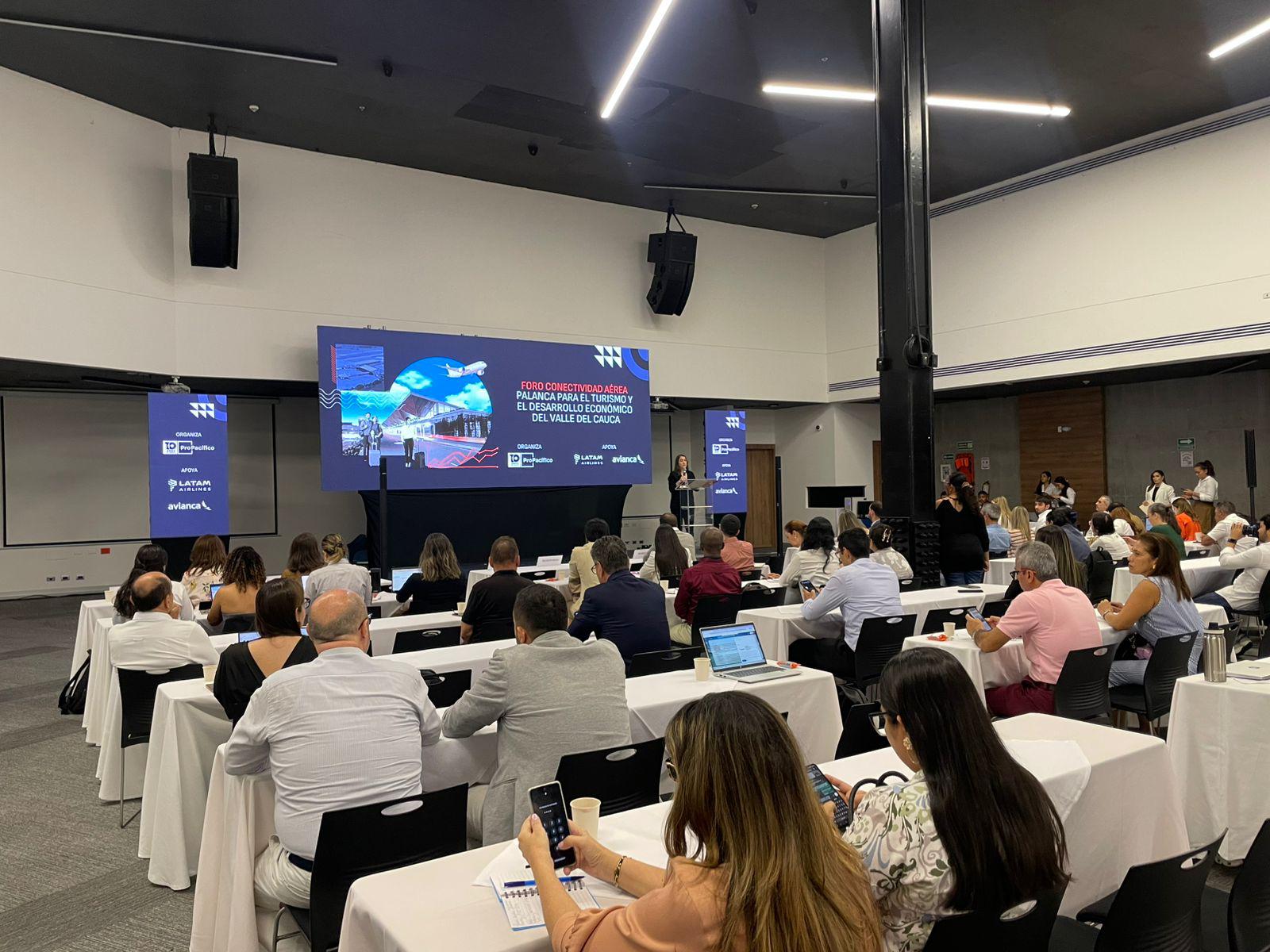Authorities and unions call for speedy new concession for Valle del Cauca's Alfonso Bonilla Aragón Airport: calls from regional forum

Expediting the new concession for the Alfonso Bonilla Aragón International Airport in Valle del Cauca, and consolidating a vision and roadmap to make this airport a driving force for the department's economy and positioning it as a regional and international benchmark, were the main calls from authorities and industry groups during the forum "Air Connectivity: Leverage for Tourism and Economic Development in Valle del Cauca."
The forum was organized by ProPacífico with support from Latam Airlines and Avianca.
The forum 
Forum "Air Connectivity: A Lever for Tourism and Economic Development in Valle del Cauca." Photo: ProPacífico
The future of the Alfonso Bonilla Aragón Airport is a source of concern to the people of Valle del Cauca, as the National Government has yet to open a bidding process for a new concessionaire to take over. This has been requested by the Valle del Cauca Governor's Office and the Cali Mayor's Office, as well as by unions and ProPacífico, since last year.
On August 31, the current concessionaire, Aerocali, will end its 25-year administration since 2000.
Starting September 1st, the Civil Aeronautics (Aerocivil) will take over management of the Palmira municipal airport, which serves Cali and the rest of Valle del Cauca, a situation that has regional leaders concerned.
The intervention by this state entity in the Bonilla Aragón, through Aerocivil, will be carried out while the process for the new concession with a private company is underway, but a bidding process for 2025 is not yet in sight.

Forum "Air Connectivity: A Lever for Tourism and Economic Development in Valle del Cauca." Photo: ProPacífico
According to Governor Dilian Francisca Toro and Cali Mayor Alejandro Eder, a new private concessionaire with sufficient financial strength is needed to modernize the Bonilla Aragón highway as it embarks on a path to progress.
During the forum "Air Connectivity: A Lever for Tourism and Economic Development in Valle del Cauca," the need to strengthen air connectivity, not only in the region but throughout the country, was also emphasized.
Delegates from the Airport Projects Department of the National Infrastructure Agency (ANI), IP Aeropuertos de Suroccidente, LATAM, Avianca Public Affairs, JetSmart, and IATA Colombia participated in the event.
Also present were the Secretary of Economic Development of Cali, Mabel Lara, as well as the Secretary of Tourism of Valle del Cauca, Miyerlandi Torres, along with representatives from the Colombian Association of Travel and Tourism Agencies (ANATO), the National Federation of Biofuels of Colombia (Fedebiocombustibles), the Renewable Energy and New Business Association of the Sugarcane Growers Association of Colombia (Asocaña), and KPMG.
Forum "Air Connectivity: A Lever for Tourism and Economic Development in Valle del Cauca." Photo: ProPacífico
"At this forum, we emphasize that the airport is much more than just an infrastructure for the arrival and departure of people and planes; it's a hub for tourism and business competitiveness in the region. Furthermore, given Colombia's geographical conditions and the limitations of other modes of transportation, we cannot forget the social value represented by air travel, which in some cases is the only means of transportation," said María Isabel Ulloa, Executive Director of ProPacífico.
"Therefore, we must insist and demand that the National Government recognize the need for the airport concession. It is essential that the ongoing PPP project continue its approval phase and that the selection process for the new concession be launched before September of this year. This multi-stakeholder conversation is intended to broaden our minds and understand the importance of the Airport as a development hub," the executive stated.
Various stakeholders from the airport ecosystem present agreed on these aspects, asserting that the concession must guarantee sufficient investment for the airport's modernization, incorporate end-user service indicators, and flexibility mechanisms that allow for growth in line with airline industry demand. The lessons learned from COP16 were also highlighted, demonstrating the airport's capacity to meet increased demand, as well as the opportunities arising from its privileged geographic and climatic conditions for connecting with key markets.

Forum "Air Connectivity: A Lever for Tourism and Economic Development in Valle del Cauca." Photo: ProPacífico
"We need a quality airport for southwestern Colombia. Our competitive advantages will diminish if we don't make progress on this issue. This year, we project to receive 3,100,000 visitors, and we're growing at 15% in tourism while the rest of the country is growing at 8%. But if we don't have a good airport, our opportunities will begin to shrink," said Cali's Secretary of Economic Development.
Finally, emphasis was placed on the need for a coordinated agenda between the National Government, local authorities, the private sector, and ecosystem stakeholders, integrating airport operations with the development of tourism, logistics, and security in the region.
Advances in sustainability and competitiveness were also discussed, such as the promotion of the use of sustainable aviation biofuels (SAF).
The Cauca Valley has significant accumulated capacity, due to its agroindustry and the current production of sustainable biofuels for aviation.
With this forum, ProPacífico reaffirmed the need to continue promoting spaces for multi-stakeholder dialogue and collaborative work to enhance airport development and its productive linkages.

Forum "Air Connectivity: A Lever for Tourism and Economic Development in Valle del Cauca." Photo: ProPacífico
The National Government is structuring a private initiative project that will expand and modernize the Alfonso Bonilla Aragón Airport. This project is expected to be awarded in the first half of 2026. Let's remember that the airport, beyond being an infrastructure, is part of a logistics chain of connectivity that is essential for the region's economic development," said Carlos Alberto Carrasco of the ANI.
"This new administration, which will take office on September 1, is extremely important. We have three requests: establish a working group to address how we will improve our international and domestic air connectivity; conduct ten- to twenty-year strategic planning with investments in infrastructure and experience for our visitors and tourists; and promote the airport as a tourist attraction," said the Secretary of Tourism of Valle del Cauca.
“What makes the airports in Bogotá and Medellín so dynamic is that they combine passenger and cargo traffic. We must generate growth in cargo traffic in the region. Furthermore, Cali has a location that we believe would allow, for example, direct flights to Asia, not only due to its geographic location but also due to its altitude. We must take advantage of this airport's versatility,” noted IATA Colombia Country Manager Paula Bernal.
"We need a competitive, modern airport, designed not only to offer better services to passengers, but also operationally capable of meeting the needs of airlines in Colombia and around the world. We trust that the process for the new airport concession will recognize that Colombia and Cali face a significant competitive challenge to ensure the airline industry continues to grow," said Felipe Andrés Gómez, Avianca's Vice President of Public Affairs.
According to Aerocivil, upon the expiration of the current concession contract, the entity will move forward with the reversion, planning, delivery, and acceptance process, as well as the actions planned to ensure the continuity and safety of airport services.
What do they say at Aerocivil? During the second session of the Alfonso Bonilla Aragón Airport Accidental Commission of the House of Representatives, with representatives from Aerocivil and ANI members, Aerocivil indicated almost a month ago: "To guarantee the success of the process, Aerocivil projects initial investments of 59.877 billion pesos in the first eight months. Likewise, within its projection, it has estimated up to 90 billion pesos in the event that it is necessary for the entity to operate the airport for up to 11 months."
In addition, the operational organizational chart and corporate processes associated with human resources, technology, communications, and maintenance were presented. The planned actions include maintenance of infrastructure such as terminals and runways. According to Aerocivil, these projects are being discussed, but the most important issue so far is the availability of resources for a period of eight to 11 months, depending on what is needed.
"The Civil Aeronautics Department sends a message of complete peace of mind to the public and to users of air passenger and cargo transportation, guaranteeing the provision of airport services during this transition phase at the main airport in Valle del Cauca and southwestern Colombia," Aerocivil stated.
Since the potential operation of Aerocivil became known in Valle del Cauca last March, hoping that the concession to a private company could be expedited to allow for investments in construction and development at the airport, the governor of Valle del Cauca, along with the mayor of Cali and associations such as ProPacífico, have spoken out, reiterating their fears for the future of the airport.
The governor warned that the wait for the private concession has been going on since last year, and although she is closely monitoring the progress of the process with Aerocivil, she is concerned about the delay because the second half of the year is already underway and no details of the call for proposals for the new concession have been released, which is detrimental to the development and efficiency of the airport.
Correspondent for EL TIEMPO
Consult other information of interest 
Costa Rica, a new destination. Photo:
eltiempo





